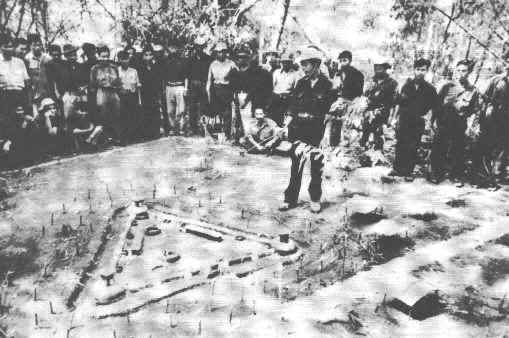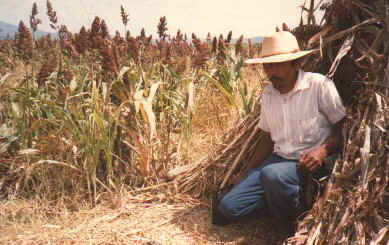

First Image: North Vietnamese National Liberation Front Forces study for an attack on a strategic hamlet in the South, 1963
It seems no accident that western anthropologists became increasingly interested in "peasants" after the Second World War. The formal structures of colonialism were being dismantled, and the transition to the Cold War was provoking an increasing interest in another face of the colonised "Other", the insurgent peasant.
The governments of Northern metropolitan countries were deeply alarmed by what peasant armies did in the Korean War, and then to the French at Dien Bien Phu, in Vietnam, in 1954. Poor rural people seemed to responding to capitalist development by supporting communist political movements. Decolonisation produced a new way of understanding the world —one in which there was an obvious gap between a still largely rural "Third World" and the more affluent industrialised North. The success of the Marshall Plan in reconstructing post-war Western Europe gave some credence to the idea that aid and planning economic change could narrow the gap and produce "development" in the sense of the creation of modern capitalist economies in the "Third World".
 Second Image: One definition of "development". Farmer in a field of sorghum, sown and harvested by machinery, treated with chemical fertilizers, herbicides and pesticides, and used as an element of balanced feedstuffs fed to cattle.
Second Image: One definition of "development". Farmer in a field of sorghum, sown and harvested by machinery, treated with chemical fertilizers, herbicides and pesticides, and used as an element of balanced feedstuffs fed to cattle.
But "development" was never a purely economic project from the Northern point of view. The Third World was the arena where the capitalist First World and communist Second World were apparently locked in battle to determine humanity’s future. From the Northern point of view, "the peasant" was a political threat which had to be removed by promoting "development". What the North meant by "development" was economic transformations which would lead to mass urbanisation, proletarianisation and the removal of this "backward" segment of the population. It was, of course, generally argued that this definition of development was morally sound: people who lost their livelihood as peasants should, in principle, be able to share in the benefits of economic modernisation and industrialisation in the long term, and therefore end up better off in material terms.
Third Image: New faces of peasant insurgency at the end of the Twentieth Century. Comandante Tacho and Subcomandante Marcos of the Zapatista National Liberation Army. The Zapatista movement in the Mexican state of Chiapas declared itself in rebellion against the neoliberal government of Carlos Salinas on January 1st, 1994, the day the North American Free Trade Agreement between Mexico, the United States and Chiapas came into force.
Many anthropologists responded to the new post-war discourse of development with the same naive enthusiasm as they had responded to ideas about the civilising mission of European colonialism — indeed, the two were often seen as going together in the first decade after the war, when decolonisation was still relatively limited. In any case, "development" seemed to most people like something that was bound to happen anyway, and many anthropologists saw advising on how development policies should be adjusted to suit local cultural practices as a worthy professional objective, as, indeed, it still arguably is. What very few people seemed to see was that the new "development" discourse was not simply problematic as a model for economic and social change, because of its ethnocentric biases. It also reflected the geo-political interests of economically dominant nations and it embodied a hidden agenda that focused on counter-insurgency. Korea and Vietnam were not the only expressions of that hidden agenda: units of the British army carried out preemptive massacres of potential communist sympathisers in villages in Malaysia and the Indonesian army was given a carte blanche by the western powers to do the same on a much larger scale in 1965.The next page shows video clips and more information on the Chiapas conflict and counter-insurgency strategies.
Fourth Image: Members of a Tojolabal community in Chiapas demand that soldiers leave as tension increases following the massacre of women and children by paramilitary gunmen in Acteal in December, 1997.